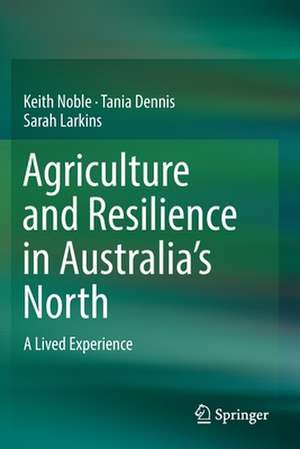Agriculture and Resilience in Australia’s North: A Lived Experience
Autor Keith Noble, Tania Dennis, Sarah Larkinsen Limba Engleză Paperback – 20 aug 2020
Through historical analysis, the book compares historic and contemporary aspirations for northern development, and discusses the influence of the built environment on individuals as well as access to health and other social services.
Exploring the implications of individual resilience strategies for policy development within the broader context of northern development and evolving environmental governance, the book also highlights the fact that this is occurring in a new geological epoch – the Anthropocene.
The book will provide a unique perspective and understanding to government, individuals and industries interested in northern Australia and its relationship to the world
| Toate formatele și edițiile | Preț | Express |
|---|---|---|
| Paperback (1) | 637.78 lei 6-8 săpt. | |
| Springer Nature Singapore – 20 aug 2020 | 637.78 lei 6-8 săpt. | |
| Hardback (1) | 643.99 lei 6-8 săpt. | |
| Springer Nature Singapore – 20 aug 2019 | 643.99 lei 6-8 săpt. |
Preț: 637.78 lei
Preț vechi: 750.33 lei
-15% Nou
Puncte Express: 957
Preț estimativ în valută:
122.04€ • 127.76$ • 100.98£
122.04€ • 127.76$ • 100.98£
Carte tipărită la comandă
Livrare economică 05-19 aprilie
Preluare comenzi: 021 569.72.76
Specificații
ISBN-13: 9789811383571
ISBN-10: 981138357X
Pagini: 226
Ilustrații: XV, 226 p. 17 illus., 15 illus. in color.
Dimensiuni: 155 x 235 mm
Greutate: 0.35 kg
Ediția:1st ed. 2019
Editura: Springer Nature Singapore
Colecția Springer
Locul publicării:Singapore, Singapore
ISBN-10: 981138357X
Pagini: 226
Ilustrații: XV, 226 p. 17 illus., 15 illus. in color.
Dimensiuni: 155 x 235 mm
Greutate: 0.35 kg
Ediția:1st ed. 2019
Editura: Springer Nature Singapore
Colecția Springer
Locul publicării:Singapore, Singapore
Cuprins
Part 1: North Australian Theory and Realities.- Chapter 1. Agriculture as a Human Endeavour.- Chapter 2: Resilience Discourse and Adaption Strategies.- Chapter 3: Agricultural Development in Northern Australia.- Chapter 4: Framing Northern Australian Agriculture’s Future.- Chapter 5: Why, and How, to Consider the Resilience of Individuals?.- Part 2:Lived Experience - Why People, Place, and Services Matter.- Chapter 6: The Resilience Strategies of Individuals.- Chapter 7: The Influence and Importance of the Built Environment.- Chapter 8: Health as a Building Block for Resilience.- Part 3. Discussion and Conclusions.- Chapter 9: Bringing it together - the Thread of Fairness.- Chapter 10: A Fair Go, a Fair Future.
Notă biografică
Keith Noble trained as an Agricultural Extension Officer and worked in a range of industries before focusing on farming in Queensland’s Wet Tropics. With cross-cultural communication skills and expertise, particularly with regional Australians and their communities, Keith is able to solve problems, identify opportunities, and provide solutions that build on the inherent strengths of people and their place. Keith chairs Terrain NRM, the Regional NRM body for Queensland’s Wet Tropics bioregion.
Tania Dennis is an architect from the top end of Australia, who has designed an impressive series of places and buildings that allow people access to healthy living. Winner of numerous architecture awards, including the National Award for Small Project Architecture and Commendation for Sustainable Architecture, Tania’s projects respond to and offer positive built spaces that influence how communities function and are perceived. By working with local people, makers and artists, and using skills applied through local culture to architecture, interior and urban design, Tania’s work offers intricate and insightful interpretations of place.
Sarah Larkins is an academic general practitioner and Associate Dean of Research at the College of Medicine and Dentistry, James Cook University. Sarah has particular skills and experience in Aboriginal and Torres Strait Islander health research and health services as well as workforce research, and is an internationally recognised expert on social accountability in health professional education. Sarah is also Co-Director of the Anton Breinl Research Centre for Health Systems Strengthening, a centre of the Australian Institute of Tropical Health and Medicine. Sarah's particular focus is on collaborating to improve equity in health care services for underserved populations, particularly rural, remote, Indigenous and tropical populations, and on training a health workforce with appropriate knowledge, attitudes and skills for this purpose
Textul de pe ultima copertă
This book examines the mechanisms and strategies farmers in North Australia adopt to manage the setbacks and challenges they face. This social research is based on farmers’ experiences, but also draws on the author’s own experience after his tropical fruit farm was destroyed by two Category 5 cyclones in five years.
Through historical analysis, the book compares historic and contemporary aspirations for northern development, and discusses the influence of the built environment on individuals as well as access to health and other social services.
Exploring the implications of individual resilience strategies for policy development within the broader context of northern development and evolving environmental governance, the book also highlights the fact that this is occurring in a new geological epoch – the Anthropocene.
The book will provide a unique perspective and understanding to government, individuals and industries interested in northern Australia and its relationship to the world
Exploring the implications of individual resilience strategies for policy development within the broader context of northern development and evolving environmental governance, the book also highlights the fact that this is occurring in a new geological epoch – the Anthropocene.
The book will provide a unique perspective and understanding to government, individuals and industries interested in northern Australia and its relationship to the world
Caracteristici
Provides a detailed insight into the resilience strategies of individuals operating small enterprises across large, sparsely-populated areas Presents a detailed and comprehensive review of contemporary resilience discourse and adaptation strategies Provides a succinct history of Northern Australia: a platform to better examine and understand the historic aspirations for northern development, how these differ from contemporary aspirations, and what lessons of history need to be remembered Introduces the evolving concept of “fairness” is considered as a pivot for policy decision-making
